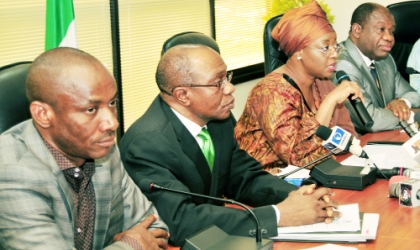Business
Don Tasks FG On SMEs’ Growth

A university teacher, Dr Gonna Wafure has urged the Federal Government to formulate policies that would promote the growth of Small Medium Enterprises (SMEs) and develop the nation’s economy.
Wafuru, an economics lecturer at the University of Abuja, while speaking to aviation correspondents, yesterday said that government has a role to play in the growth of SMEs through soft loans and reasonable lending rate.
According to him, SMEs can create abundant jobs, as well as encourage youths to be self employed, if entrepreneurs have access to funds.
He noted that SMEs contributed significantly to the growth and development of the nation’s economy, saying it however, requires government policies that would enhance its growth backed by adequate financial assistance.
“If entrepreneurs can have access to funds, it would bring about job creation and encourage Nigerian youths to be self employed.
“Some entrepreneurs are not always given the chance to showcase their products during trade fairs because of some stringent policies in the country”, he said.
The university don said that the Nigerian economy which depends on crude oil exports for 98% of its revenue was vulnerable to the multiplier effect of unstable crude oil prices at the global market.
“For a developing country like Nigeria, which depends on crude oil exports for 98% of its annual revenue, the economy is bound to suffer, and there is bound to be a multiplier effect on all sectors.
“There will be inflation, job cuts causing unemployment and crime, budget deficits due to lack of funds to finance government expenditure based on expected revenue and inability to finance key sectors like agriculture among others.
“The nation’s foreign exchange earnings will also drop, because we buy foreign goods with the proceeds of the oil sold”, he said.
Wafuru, therefore, urged the government to diversify the nation’s economy from being mainly a mono-economy or oil- dependent economy, by investing in other key sectors to generate income for the nation.
By: Corlins Walter
Business
Two Federal Agencies Enter Pack On Expansion, Sustainable Electricity In Niger Delta

Business
Why The AI Boom May Extend The Reign Of Natural Gas

Business
Ogun To Join Oil-Producing States ……..As NNPCL Kicks Off Commercial Oil Production At Eba

-

 Politics5 days ago
Politics5 days agoAPC Releases Adjusted Timetable For Nationwide Congresses, Convention
-

 Sports2 days ago
Sports2 days ago2026 WC: Nigeria, DR Congo Awaits FIFA Verdict Today
-
Sports5 days ago
DG NIS Wants NSC Board Constituted, Seeks Increased In Funding
-

 Business5 days ago
Business5 days agoCustoms Seek Support To Curb Smuggling In Ogun
-

 Featured5 days ago
Featured5 days agoINEC Proposes N873.78bn For 2027 Elections, N171bn For 2026 Operations
-

 Sports5 days ago
Sports5 days agoSWAN Rivers Set-up Five Functional Committees
-
Sports5 days ago
NSC Disburses N200m Training Grants To 26 Athletes
-
Sports5 days ago
‘NTF Will Build On Davis Cup Success For Brighter Future’

